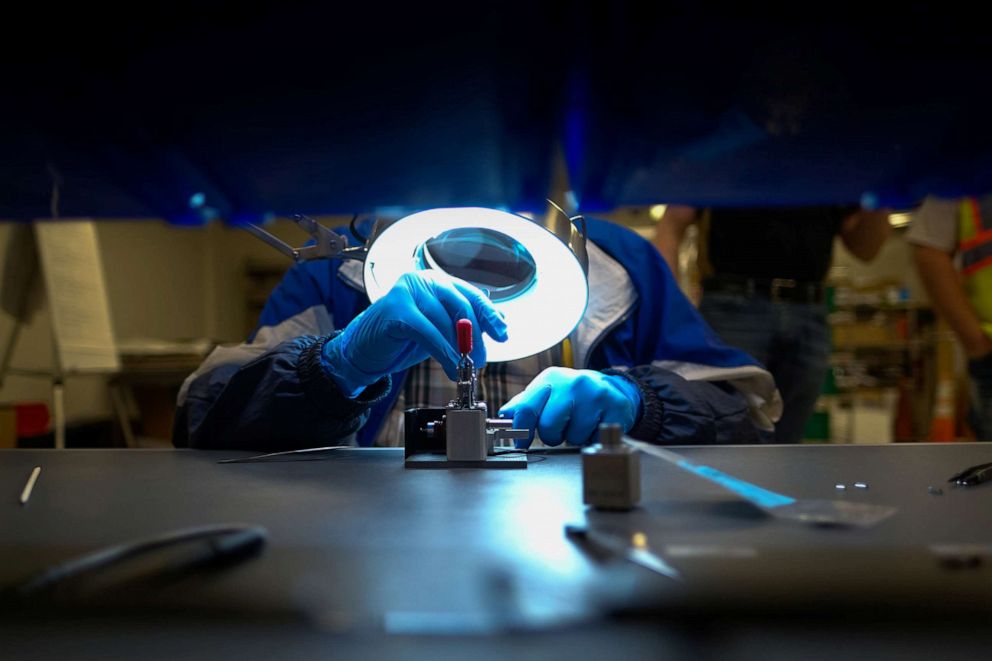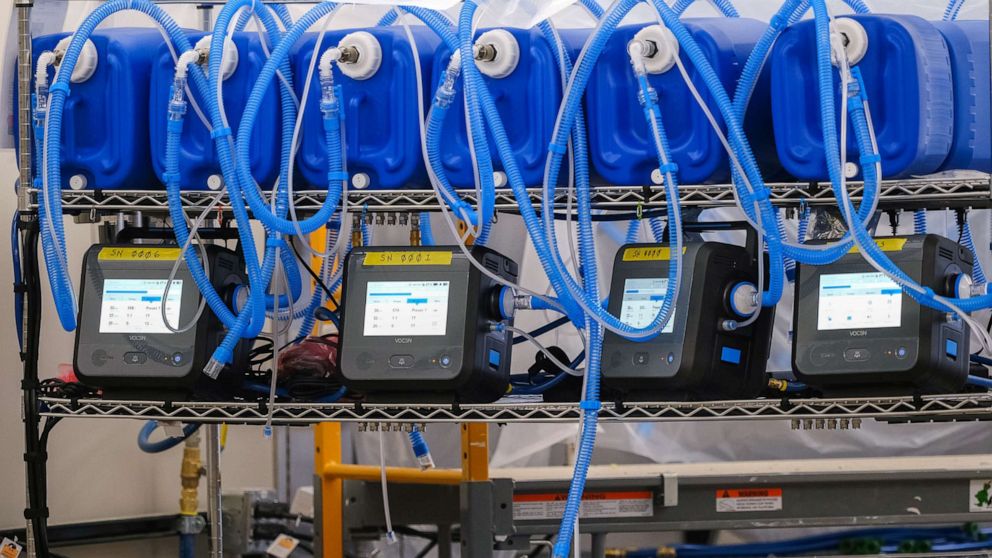For GM employees building ventilators on COVID-19's front lines, their work is actually saving them
Penni Cox wakes up before dawn, taking her coffee to-go as she makes the 10-minute drive down the road from her home to the General Motors campus in Kokomo, Indiana. She arrives at the Engineering Resource Center as the sun rises.
Until recently, its three stories stood empty; auto work in Kokomo has steadily drained, and the absence of opportunity has meant indefinite layoffs. Then, as the coronavirus swept across the globe, the building surged to life, reopening to make much-needed ventilators for the nation's sick.
"It has been nonstop, and a whirlwind of emotions," Cox told ABC News.
She was laid off on March 13, out of a job after nearly 14 years -- three generations of her family, a part of the United Auto Workers. Her aunt, mother, grandmother, all worked at GM; her son will now join making ventilators; her grandfather worked across the street at Fiat-Chrysler. Before being laid off, her husband also worked at that FCA plant, where in late March, a fellow UAW worker tested positive for COVID-19 then died.
"It's scary. The virus is scary. Not knowing our plant's future is scary. But we won't give up," Cox said. "Work has slowly declined, we've been losing people to layoffs for a while, and unfortunately I was one of them."
"You teach your children to help others. But when the time comes and you can finally do it -- when they call you and say, 'Hey, do you want to make ventilators?' It's like -- well yeah!"

Her work ceased just as the virus flared, and hospitals braced for a deluge of patients and a looming ventilator shortage. As a precaution against the spread of COVID-19, the plant finally shut down.
In late March, General Motors and Ventec Life Systems announced a partnership to mass-produce critical care ventilators in response to the COVID-19 pandemic, pledging 30,000 by the end of August: a $489.4 million contract with the Department of Health and Human Services. Cox and her United Autoworkers Local 292 team were brought back.
Working "around the clock," as General Motors said in a statement, their first ventilators began rolling off the line in a matter of weeks.
"Right now? It's much more rewarding making a ventilator than making a car," Cox said. "We're all working long hours, it gets tiring, but when you see who you're helping -- it's all worth it. I love my Chevys but I definitely feel much more sense of pride in making a ventilator."
"There's a mood in there that hasn't been for a long time -- we've been shrinking for so long," UAW Local 292 President Matt Collins told ABC News.
"We've got mixed emotions," he said of the good fortune brought about by grim circumstances. "But this has made a lot of new opportunities for a lot of people."
Penni Cox arrives at the plant before 6:30 a.m. each day, where she -- and everyone else -- gets immediately checked for a fever before being admitted. Cox wears a mask and gloves throughout the day, except for when she eats or drinks.
On the line, Cox makes the ventilator back cases.
"We do a lot of messing with the screws," Cox said. "The part that hangs on the cart you push around, that hook right there. Then a thermal cover, plastic pieces to the center band -- it basically holds the main guts in."
The Kokomo plant was picked to make the ventilators because it already handled precision electronic parts -- and it had preexisting clean rooms, required for medical equipment production by the FDA.

"We're pretty dedicated," Cox said. "There are a lot of people putting in 10, 12 hour days. They just kept telling us, 'We don't have any work for you,' and we just kept saying, Well you've got to!' And then this came along. We're kind of the little engine that could."
From a workforce that was once roughly 12,000 strong, their union now has whittled down to a few hundred. But the ventilator production is expected to boost numbers operating out of the Kokomo facility to roughly 1,000.
"We're so hungry for work, we'd build anything. We'd make cakes," Collins said. His plant has seen hundreds of layoffs in the last few years, he said. And as membership declines, maintaining the local union can itself become more of a financial burden.
"But now this is going to save lives, and it's just a really cool thing," he said.
Collins, also a third-generation GM worker, is himself at higher risk for infection: Three years ago, he told ABC News, doctors found a tumor and removed most of one of his lungs. His voice wheezes lightly as he talks.
"I worry about going anywhere -- but I feel safer going to the plant than I do going to the grocery store," he said. "I couldn't sit this out -- I wanted to be a part of it. There's no place I'd rather be."
Asked about the parallels to World War II's war effort -- to "Rosie the Riveter" -- Penni Cox shrugged.
"Not so much," Cox said. "This is really nothing new for us -- people give us credit and that's nice but we're just doing our jobs."
"We're not the heroes," she continued. "The medical staff out there -- they're the real heroes. And they're the ones that need help. We're just trying to back them up."
Once their contract with Ventec is over, the future is uncertain. There are no assurance there will be work ahead, Cox said.
"Our plant doesn't really have anything to go back to," she said. "We're hoping that something big comes of this for us. 'Cause when the ventilators are done -- we could be done."
"I feel like this is our saving grace -- and if we can save at least one person in the process, that keeps us going every day," Cox said. "The long hours, the sore hands, the climbing 50 million steps every day, it'll all be worth it. So just let us show you what we can do."
What to know about the coronavirus:
- How it started and how to protect yourself: Coronavirus explained
- What to do if you have symptoms: Coronavirus symptoms
- Tracking the spread in the U.S. and worldwide: Coronavirus map
Tune into ABC at 1 p.m. ET and ABC News Live at 4 p.m. ET every weekday for special coverage of the novel coronavirus with the full ABC News team, including the latest news, context and analysis.



